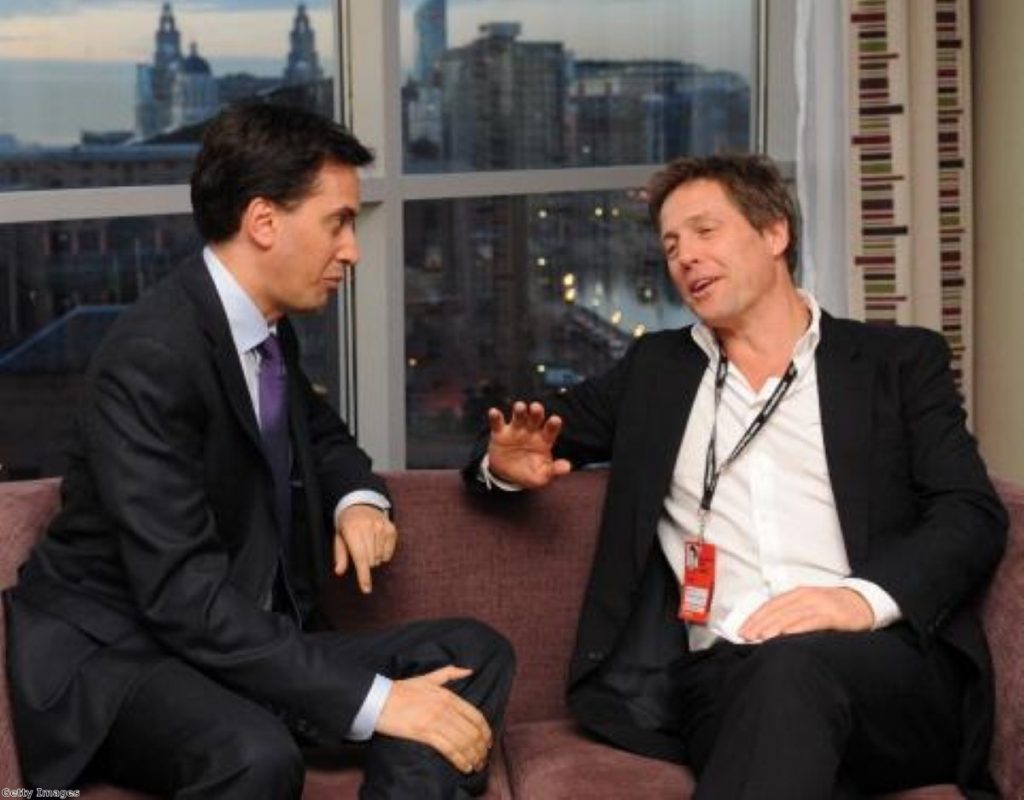Sketch: Hugh Grant tickles Labour’s tummy
Hugh Grant plays Hugh Grant at the Labour party conference.
By Ian Dunt Follow @IanDunt
Hugh Grant and Labour don't really go together. Robert Carlyle would be a better Labour man. He has a sweet-natured gruffness to him that sums up the best of the party. David Tennant chipped in with Labour's election broadcasts last year and it worked just fine, his light Scottish accent giving an authenticity to some of the most achingly over-extended metaphors in British political history.
Hugh's public school persona, on the other hand, should by all rights belong to a Tory, although as an actor he's presumably incapable of voting for them. Perhaps the Lib Dems weren't so cheeky when they tried to claim him as one of their own last week after all.
Whether it's because of a waning career or because he's reached the age where men like their opinions to be taken seriously, Hugh (and we call him Hugh, not Grant, because he's a celebrity and we therefore feel like we know him intimately) has made himself one of the chief figures in the phone-hacking scandal. His sting operation on a hack was a satisfying example of re-appropriation. His appearance on Question Time showed him to be well-informed, eloquent and genuinely passionate. Now he's touring the three main party conferences, trying to make sure the parties stick to their tough stance on Murdoch after the initial swell of outrage has subsided.
Labour man or not, the audience at last night's fringe event listened to his pronouncements with a reverence they might reserve for God. In the grotesque human confines of the British party political conference, Hugh is like a shimmer of light piercing the bottom of the ocean. Even his fellow panellists, including representatives from Pen and Labour's shadow culture secretary Ivan Lewis, seemed a little star-struck. The only figure to challenge his dominance was Tom Watson, a rugged campaigner on phone-hacking, who hovered around the door for a while before being beckoned in by someone in the audience. "I think you're allowed in, Tom," they eventually said, smirking, before an explosion of applause followed him into the chamber.
Hugh was undeniably charming. "Your association with Murdoch – I'm not sure that's a good look for you," he told Labour members, to considerable laughter. At first you notice how similar he is to one of his characters. The you realise he's only ever really played one character: Hugh Grant. This was Hugh Grant playing himself.
But for all the love in the room, there was a central flaw there, a dangerous weakness you play with any time you involve a celebrity in the political process. Hugh's assessments, terms of reference and remedies are simple, black-and-white things. He seemed, to my mind, intolerably dismissive of tabloids. His pronouncements veered perilously close to a 'goodies' and 'baddies' narrative which doesn't suit his intelligence but could credibly have emerged from his industry. He calls Murdoch, with only a little sarcasm, Voldemort.
On the panel, those who had tried to harness Hugh, to wield him as a publicity engine, were trying to smooth the edges. Pen's representative even cited his own five-year-old son, who still talks about goodies and baddies – a dig, you couldn't help but feel, against the star in their midst. Privacy, he pointed out, was not quite the simple concept it was being presented as. Trafigura, for instance, tried to use privacy laws against the Guardian when fighting off their coverage.
The panacea to this good vs evil narrative, I hate to say, was Ivan Lewis, who has spent much of his career toying with the idea of being impressive, like fireworks going off underwater. Yesterday, he passed confidently over the line, maintaining a thoughtful and precise stance on the different elements of the scandal.
He discredited the argument that public interest and 'of interest to the public' were easy to define, but stressed that it didn't matter. The question was not 'what's the difference'. The question is 'what sort of body should we use to establish the difference on the case-by-case basis?' He treated attacks on the Daily Mail with considerable caution, warning delegates that as soon as the debate strayed from 'they broke the law' to 'they're saying things we don't like' it will have gone to a very bad place indeed.
He wasn't charming or handsome. He wasn't funny. In fact, at several moments he was decidedly unfunny. But that sensitive, careful approach was worth considerably more than the broad brush strokes on offer elsewhere. He also, for what it's worth, sounds like a Labour man.





-01.png)